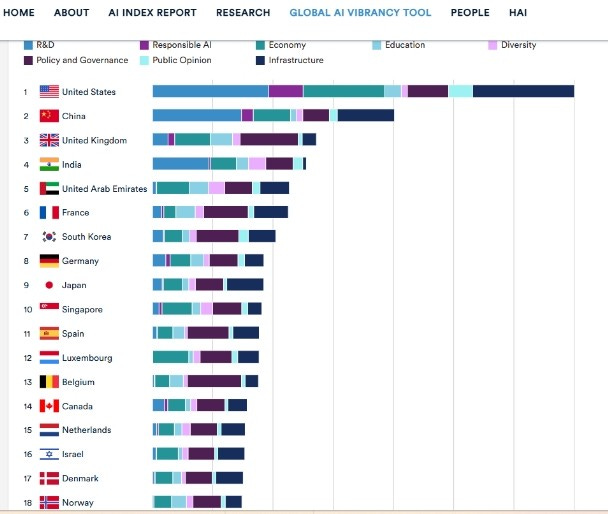Mind and Iron: Making sense of Perplexity
The startup is charging. Should we wave the cape? Also which country is winning the AI war.
Hi and welcome back to another spicy edition of Mind and Iron. I'm Steven Zeitchik, veteran of The Washington Post and Los Angeles Times and lead pharmacist at this newsy drugstore.
Every Thursday we come at you with the future of tech and science, and some notions on how to think about it all. Please consider supporting us.
Unfortunately that drugstore metaphor above is not coincidental; a cold-flu has attacked operations here at M&I this week and left us a little worse for wear. (And also left us asking questions like how come CRISPR can kick the most intractable diseases but can't slow the common flu.) So a slightly shorter issue this week. We still wanted to dish on Perplexity, the startup that is taking over the world, and how you should feel about such a conquest. Also, Stanford has just released its annual ranking of AI strengths by country, and the results are…instructive.
We'll be taking our customary Thanksgiving break next week, so back at you with a full complement in December.
First, the future-oriented quote of the week:
“A world where everyone gets answers and doesn't have to click on links.”
— Perplexity AI’s 30-year-old chief executive Aravind Srinivas, describing (one of) his company’s missions.
Let's get to the messy business of building the future.
IronSupplement
Everything you do — and don’t — need to know in future-world this week
Scratching your head with Perplexity; Is the U.S. doing better on AI Safety than we think?
1. PERPLEXITY. A WORD YOU’VE HEARD AND WONDERED — IS THAT A WORD?
Also a platform you've heard about and thought — should I use this platform? Many of you may already have, of course; the company has millions of users. But plenty of us have also yet to dip in. So what is Perplexity AI? How should we think about it? And what role will it play in our lives in the years ahead?
This week the company is back in the news because of a new shopping feature it just launched. But really it’s in the news every week for something.
The first of those questions above has both a simple and a complex answer. The simple answer is that it's a company that tries to augment our digital lives with AI. A search engine, most obviously (more on that in a minute), but basically a firm that will incorporate machine intelligence into our digital interactions.
The more complex answer is that it seeks to build a bridge — a rather transformative one — between the online needs we have as humans and the entire non-human digital infrastructure that exists out there. The Internet was designed as a giant networking tool, aimed at connecting all kinds of people. Over time that has eroded, of course — algorithms serve up recommendations untouched by human hands; customer-service bots regularly step in front of the flesh-and-blood agents. But until now there has still been a strong human component — sometimes on the other end of what we're doing, but certainly on our end.
No one ever said "let me go look something up online" or "let me go buy something online" and then had a machine do it for them. And they certainly didn't have a situation where they said nothing and had a machine do it for them anyway.
AI will. And specifically, Perplexity does. It seeks to take the human part out of the left side of the equation as well.
Right now one of the company's main features is that search-engine — you use it to find information. But that's really only the tip of the spear. Already Perplexity has a shopping feature — something that will help you shop with simple commands (or, after a while, just by intuiting your needs). Already it has a "Pages" feature, which can generate an entire report of varying levels of sophistication based on nothing more than a prompt.
We've talked a bit about AI Assistants or Agents. Perplexity is essentially trying to build those, but from a more ground-up direction. Instead of devising an all-encompassing assistant that can do everything for you out of the gate — a GPT R2-D2 — they’re assembling it by simply enhancing some functions that are easily enhanced, like search, and then slowly layering in the more complex other stuff.
So that while it seems like Perplexity is just iterating — a little improvement here, a cool feature there — after a while pretty much every form of commerce, communication or consumption might be handled on your behalf by this program, often with limited actual intervention from you. Sending thank-you notes to old friends, shopping for a gift for a new friend, posting declarations to Facebook friends, making restaurant reservations with frenemies — pretty much everything you did on the Internet this week will eventually be handled by Perplexity AI or a competitor, and with a high degree of autonomy to boot.
That may sound a little insidious — a search engine will become that? But obviously that's how technology develops. No one came out in 1991 and said we need an Internet so we can live our best digital lives; if anything when some weird-nerd friend suggested that we looked at them kind of funny. Iterations happen. And along the way, we evolve too. Now we rely on the Internet to teach us, entertain us, gather us and feed us. In this new age we’ll rely on the Perplexities of the world to decide on and execute all of those things for us.
Even the search-engine, well, that's not really how I would describe what Perplexity does, not in the way we think of it anyway — as a tool that guides us to the best sites. Perplexity can retrieve a lot more comprehensively and present a lot more harmoniously than a Google search, especially the paid version, which has access to all the big LLM’s. It’s really more akin to a paralegal.
So that's the what. But how should we think of the company and what they’re doing?
Well for one thing, Perplexity is backed by Nvidia and Jeff Bezos; this isn't a plucky startup. Yet unlike much of Big Tech, they are also lauded for their safety. Perplexity cites links in its query results, something that seems basic but in this new AI walled-garden world is surprisingly uncommon. I'm always wary of tech companies that are touted as the more "human-centric" and "safe" varietals — it's like saying you have the fewest cavities at the candy factory. And yet there is reason for hope on this score. At least this way we know where information comes from,(potentially) reducing the possibility of disinformation (for those who want it reduced).
But let's also not kid ourselves about the smallness of the company or its human-centric concerns. Perplexity isn't Craigslist. It isn't Wikipedia.
With OpenAI and Meta honchos as their founders (Srinivas worked at the former) and about $165 million already raised, Perplexity has many Silicon Valley bona fides for a company barely two years old. They're also, as of two weeks ago, looking to raise some $500 million. This firm is aiming be a giant in our AI-era lives. And that could lead to some thorniness.
Take even the links point. Just because Perplexity cites where this stuff comes from doesn't mean that people will go to those sources or help them monetize the content they’ve provided. That’s one reason Rupert Murdoch's New York Post and Wall Street Journal last month sued Perplexity. The NY Times sounds like it's not far behind. Media companies feel (rightly) like they missed the boat on not pursuing search engines for a bigger cut of the pie earlier, since it was on their backs these firms were building their business. But at least a search engine still sent traffic and dollars those companies' way, which ain't happening when an AI crawler synthesizes all the content and cuts out all the creators.
The idea of a company that combines search and shopping is also concerning. Such data-commerce commingling is already a problem on the Internet, of course; the platforms where we learn stuff are often trying to sell us junk or show us ads. But AI cranks the problem to eleven, because now a) information and products are blended with a lot less of the original sourcing that can help us distinguish and b) we’re buying with a lot less consciousness. Perplexity insists it will keep shopping and search rigidly separate. But it sure has strong incentives not to.
What all this comes down to is that we’ll have even fewer answers on where the stuff we find online comes from. And with AI Assistants acting on our behalf, we won’t even know we should be asking the questions.
The Perplexities of the world will provide seductive services, and many of us will use them. But counting the costs is probably something we should do before they’ve exploited us or the companies become so dominant the government has to go to court to try to break them up.
Some of the coverage around Perplexity talks about the "search-engine wars heating up.” That strikes me as a little funny. Such talk seeks to put in terms we can now understand something that in a sense is still being invented. It would be like talking about the impending release of the iPod 23 years ago as the latest shot in the CD-cassette wars — right in part but totally off-base in spirit. Or casting Amazon's main effect as what it did to the bookstore down the street. Jeff Bezos did nothing less than transform the world when he made physical objects something you can pull out from a screen. Perplexity and its peers will do nothing less than transform humanity when they make our screens change how we operate out in in the world.
2. ON WEDNESDAY STANFORD’S INSTITUTE FOR HUMAN-CENTERED AI PUT OUT ITS ANNUAL GLOBAL AI VIBRANCY TOOL.
Coming under the institute’s “AI Index” data project, the tool is a drop-dead fascinating look at which countries are doing what when it comes to AI — a satellite-level view on how every major national player in the world is engaging with this new tech era. Researchers broke down the 36 countries engaging in serious AI work (it’s a big world out there!), judging them by eight “pillars,” including research, infrastructure, education and responsibility.
As Nestor Maslej, project manager of the Index, said, “AI has increased as a topic of national interest, and correspondingly narratives about which countries lead in AI have become more prominent than ever. However, there’s limited data providing a clear, quantitative view of where countries actually stand in AI…we wanted to address this gap with a rigorous tool that could help policymakers, business leaders, and the public ground these geopolitical AI narratives in fact.”
We don’t have time to delve into even a fraction of the insights gleaned, though you can check out the clickable tool for yourself.
But here’s the most important snapshot:
A couple points jump out.
First, while no one would be surprised to see the U.S. in the lead, China close behind and the U.K. pulling up in third, India and the UAE behind them might raise an eyebrow given how much more seldom we think of companies from those places. This game is getting global.
Second, the U.S. this far in the lead should do more than give us a jingoistic pat on the back. It should help inform our regulatory preferences. You’re going to hear a lot in the coming months (from lobbyists and astroturfers, mainly) about regulations and how they’re stifling the AI economy. The Trump administration is likely (though not certainly, as we’ve noted) going to pull off restraints, citing all these stiflements.
Don’t believe any of it. And this chart is why. Look at the first bar — R&D. The U.S. is way ahead of every other country, including plenty that are darlings of the anti-regulation crowd (and even notably ahead of China, a rarity on cutting-edge innovations). Check out the third bar — economy. The U.S. is legit blowing away everyone else. The notion that the U.S. government is strangling AI development is absolutely hilarious. And these metrics demonstrate how. The U.S. is still dominant even with the guard rails in place, and could probably absorb a few more.
Third and very encouragingly, check out the AI Safety metric, that second bar of “Responsible AI.” We here in this space along with many others have raised concerns that we’re not taking these issues seriously. We continue to feel that way. But at least when it comes to publishing papers on AI risk (what this metric is measuring), the U.S. takes a backseat to none.
We Americans may be rushing ahead, investing and developing intelligent machines faster than any country on earth. But at the same time we’re spreading the word about the consequences more than any country on Earth too. And it’s encouraging when a country atop the investment leaderboard also sounds the call to be careful about where all that investment leads.
The Mind and Iron Totally Scientific Apocalypse Score
Every week we bring you the TSAS — the TOTALLY SCIENTIFIC APOCALYPSE SCORE (tm). It’s a barometer of the biggest future-world news of the week, from a sink-to-our-doom -5 or -6 to a life-is-great +5 or +6 the other way. Last year ended with a score of -21.5 — gulp. Can 2024 do better? The year started off strong but the summer and early fall haven’t been great. But this week the outlook’s a little better.
PERPLEXITY IS KINDA COOL, KINDA PAUSE-GIVING: -1.0
THE U.S. DOMINATES ON AI DEVELOPMENT BUT ALSO ON SAFETY RESEARCH: +2.5







